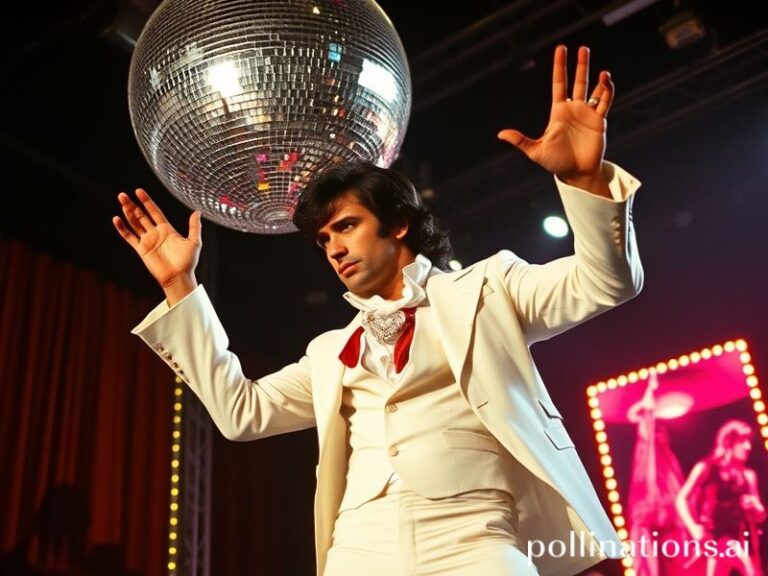Good Morning, World: How Hoda Kotb’s Exit Became a Global Soft-Power Wake-Up Call
Hoda Kotb and the Global Morning-After: How One Anchor Became a Soft-Power Export
By Dave’s Foreign Correspondent, still jet-lagged in three time zones
Cairo, 3 a.m. local—while most of Egypt is debating whether the pound will outlive the pyramids, a downtown café is streaming TODAY with Arabic subtitles. The topic isn’t the Suez, Gaza, or the latest IMF bailout, but whether Hoda Kotb’s newly announced departure from the anchor chair signals a broader retreat of American optimism—an export that, like Hollywood and drone warfare, has long been delivered pre-dawn to bleary audiences abroad.
For the uninitiated, Kotb is the contagiously cheerful Egyptian-American who helped NBC’s morning flagship stay afloat after Matt Lauer’s spectacular self-immolation. Abroad, however, she is read less as a broadcaster and more as a geopolitical mood ring. When her name trended worldwide last week, European analysts wondered if the U.S. was finally abandoning its last scraps of soft power in favor of harder stuff—like tariffs, TikTok bans, and whatever Elon is renaming this week. Asian markets barely shrugged; they’ve already priced in American volatility alongside pork futures and K-pop scandals.
From a global vantage point, Kotb’s biography reads like a State Department briefing accidentally left in the green room. Born in Norman, Oklahoma, raised in Egypt’s Alexandria and Nigeria’s Lagos—back when “Nigeria” conjured Fela Kuti, not ransomware—she speaks in the warm, unthreatening cadences of someone who’s had to translate herself her entire life. That multilingual empathy once felt quaint; now it feels like a diplomatic corps we forgot to fund. While embassies shutter and consulates install metal detectors, Kotb has spent two decades sneaking empathy across borders disguised as human-interest segments about dogs who paint.
The international press, never averse to symbolism, seized on her exit as evidence that America’s morning—once exported as reliably as corn syrup—is souring. Le Monde called it “la fin de l’éternel réveil américain,” which sounds better in French, like most disasters. Al Jazeera ran a panel asking if Arab audiences would still root for a diaspora success story once that story steps off the set. Meanwhile, the BBC—still processing its own meltdowns—framed Kotb’s departure as proof that nothing, not even relentless positivity, survives 24-hour news cycles and private equity balance sheets.
Of course, the cynics among us (hello, welcome to Dave’s Locker) note that Kotb’s brand of uplift was always a loss-leader for detergent ads and pharmaceutical spots promising side effects that read like Dante outtakes. Yet abroad, where local morning shows feature either grim state propaganda or cooking segments on how to stretch one onion into dinner for six, American breakfast television remains a guilty pleasure—televised comfort food served with a side of cognitive dissonance. Watching Kotb interview a rescued koala while wildfires devour California is, for many, a masterclass in compartmentalization they can only envy.
There is also the inescapable fact that Kotb represents a very specific American contradiction: a Muslim woman celebrated for decency in a country that can’t decide whether to ban hijabs or sell them at Target. Overseas, that contradiction plays differently. In Jakarta, she’s proof the American dream still naps between commercial breaks. In Parisian banlieues, she’s a Rorschach test: either evidence that assimilation works, or a warning that even success stories end in contractual limbo.
And so, as Kotb prepares her farewell—likely accompanied by a surprise celebrity choir and at least one golden retriever in a bowtie—the world leans in, not for the spectacle but for the subtext. If the most palatable face America could muster decides the morning is no longer worth saving, what does that say about the rest of the day? Somewhere in Lagos, a taxi driver toggles between BBC pidgin and NBC via VPN, shrugs, and mutters, “Even America’s sunshine get expiry date.”
The sun, as always, rises anyway—though these days it seems to clock in on a zero-hour contract. Kotb’s next chapter remains unwritten, but her legacy may be this: proof that in an age of weaponized pessimism, a smile with an Arab surname could still smuggle hope past customs. Whether that’s enough to keep the world from changing the channel remains an open—and unsettling—question.







